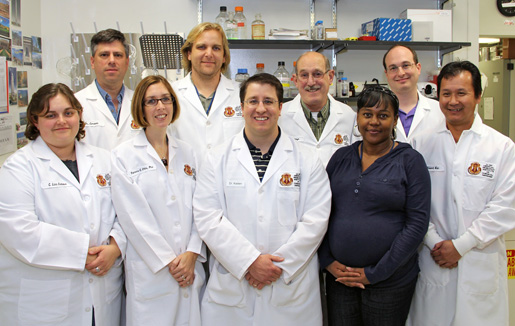News Release
U.S. Army Medical Research and Materiel Command Public Affairs Office
810 Schreider Street
Fort Detrick, MD 21702-5000
Point of Contact:
Deputy Public Affairs Officer
U.S. Army Medical Research and Materiel Command
(301) 619-2736
E-mail: USArmy.Detrick.MEDCOM-USAMRMC.List.Webmaster@health.mil
For Immediate Release -- November 17, 2011
MRICD Awarded $7.5 Million Renewal of National Institutes of Health Center of Excellence Grant
(Fort Detrick, Md.) A three-year, $7.5M grant from the National Institutes of Health was awarded to a team of researchers led by Dr. Douglas M. Cerasoli of the U.S. Army Medical Research Institute of Chemical Defense at Aberdeen Proving Ground, Md. Under the leadership of MRICD commander Col. Peter J. Schultheiss, the command is the Department of Defense's premier laboratory for the development of medical products directed against the effects of toxic chemical warfare agents. The grant will support efforts to develop enzymes for use as antidotes against poisoning by organophosphorus pesticides and nerve agents such as sarin or VX, both of which have been used in terrorist attacks.

Dr. Tamara Otto, Dr. Shane Kasten, Anjanette Cruz, project administrator, and Dr. Robert "Kwai" Kan. (Photo by Darrell Jesonis, MRICD)
The effort, titled the "Center for Catalytic Bioscavenger Medical Defense Research II," is funded by the Countermeasures Against Chemical Threats program at the National Institute of Neurological Disorders and Stroke. The project is a renewal of a prior five-year effort led by Dr. David E. Lenz, who retired from the MRICD in September 2011 after 42 years of government service. New to this iteration of the COE grant is co-investigator Dr. John McDonough, also of the MRICD, as well as Dr. Tamara Otto, who recently joined the institute. The center's staff includes scientists at both the Ohio State University and the Weizmann Institute of Science in Israel, who participated in the original effort.
This international consortium of experts, with backgrounds in the defense against chemical weapons and the directed evolution of proteins with novel enzymatic activities, will produce protein-based drugs that will destroy nerve agents and pesticides in the blood before these chemicals are able to cause any bodily harm.
"Organophosphorus compounds are among the most toxic chemicals in the world, and are a significant threat to both military personnel and civilians," said Cerasoli, the project's principal investigator. "Building on our progress over the last five-year effort, we are designing novel proteins that rapidly convert these poisons into non-toxic products in the body, preventing toxicity and protecting people from injury."
Under the leadership of Lenz, the first iteration of this project successfully identified several candidate enzymes that can protect test animals against otherwise lethal exposures to some nerve agents. The current challenges are to expand this protection to include all organophosphorus nerve agents, and to formulate the enzymes for use as drugs in humans. The goal of this project is to generate enough information to support the submission of an Investigational New Drug application to the U.S. Food and Drug Administration.
"The renewal of this grant is an important achievement for Dr. Cerasoli's research team and for the MRICD," said Dr. James Dillman, chief of the institute's Research Programs Office. "This research program is a critical collaboration between the DoD, the NIH, and both U.S. and international researchers in the pursuit of medical treatments to protect warfighters and civilians from the threat of chemical warfare agents."
###
MRICD is the nation's center of excellence for medical chemical defense research. Please visit the MRICD website at https://usamricd.amedd.army.mil/ and Facebook page at http://www.facebook.com/USAMRICD.
 An official website of the United States government
An official website of the United States government
 ) or https:// means you've safely connected to the .mil website. Share sensitive information only on official, secure websites.
) or https:// means you've safely connected to the .mil website. Share sensitive information only on official, secure websites.


